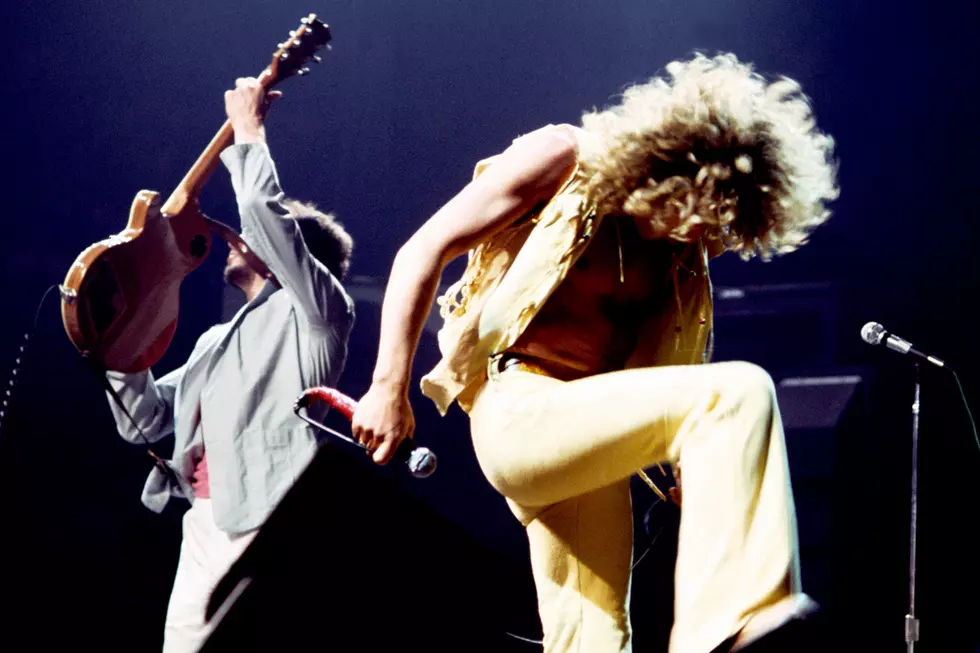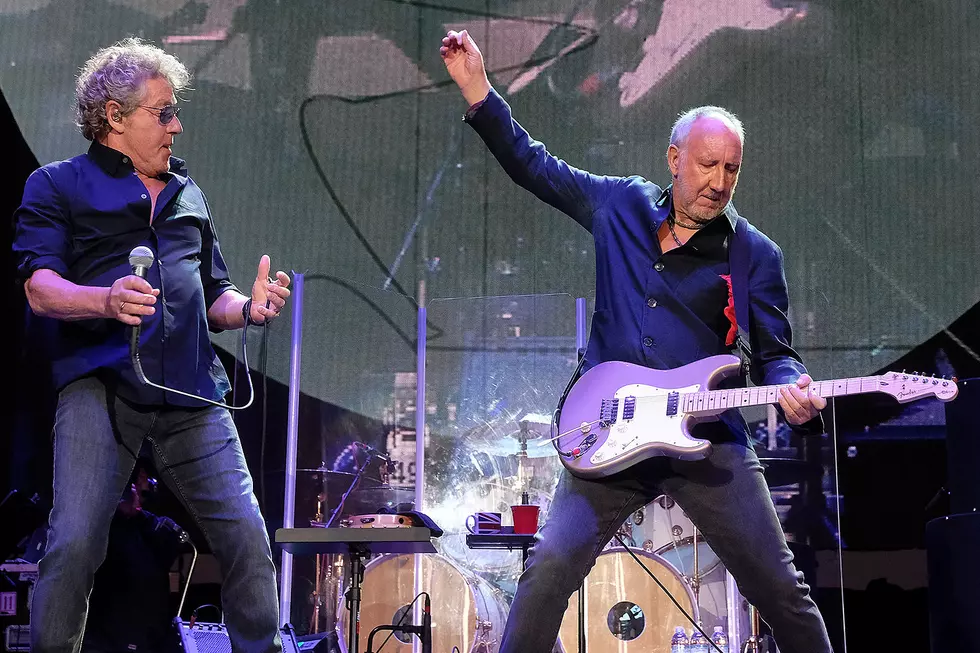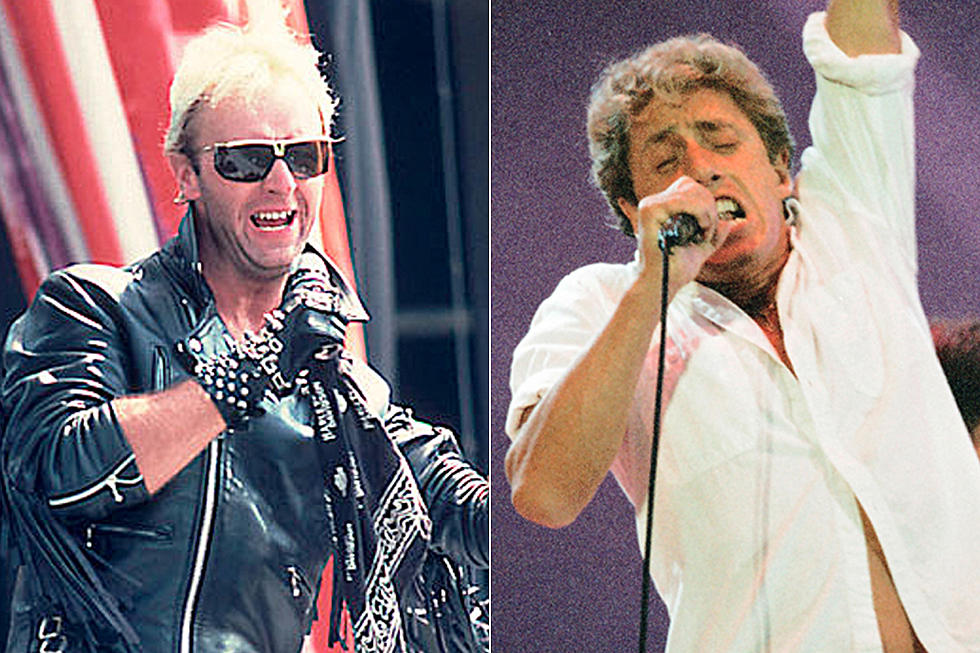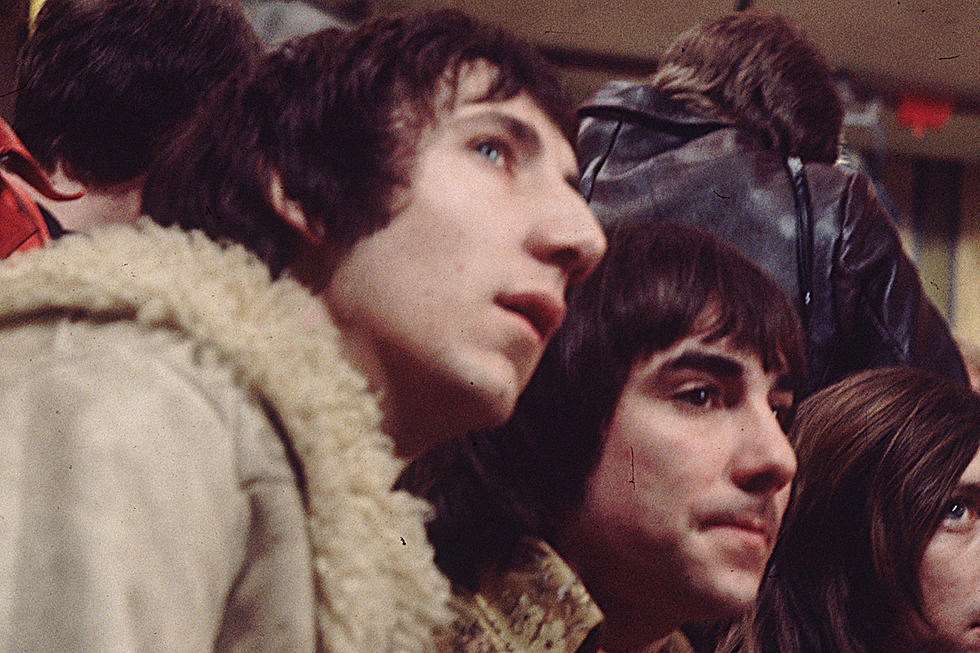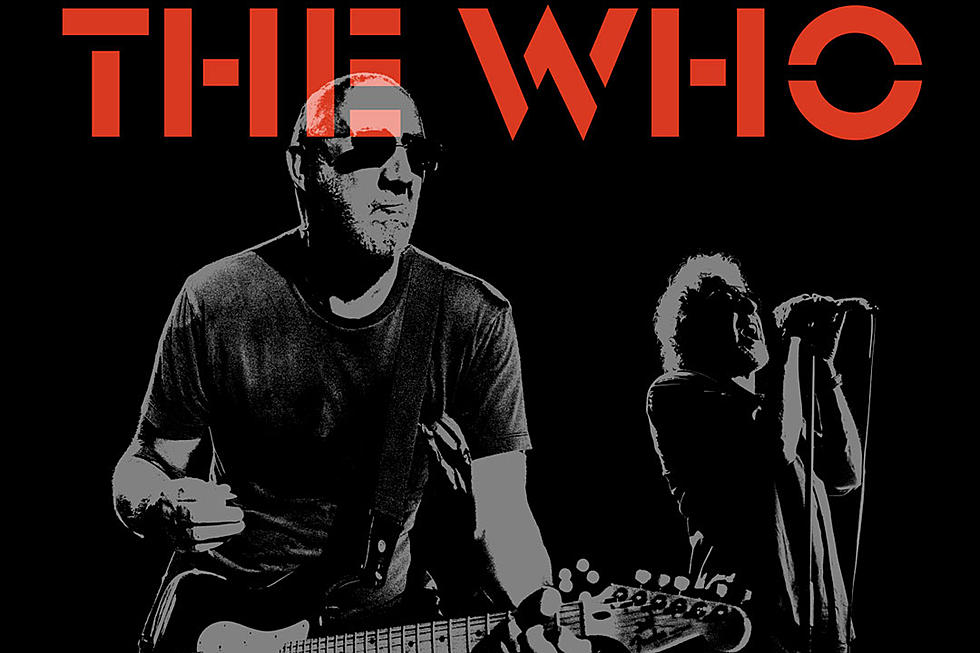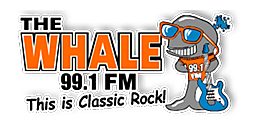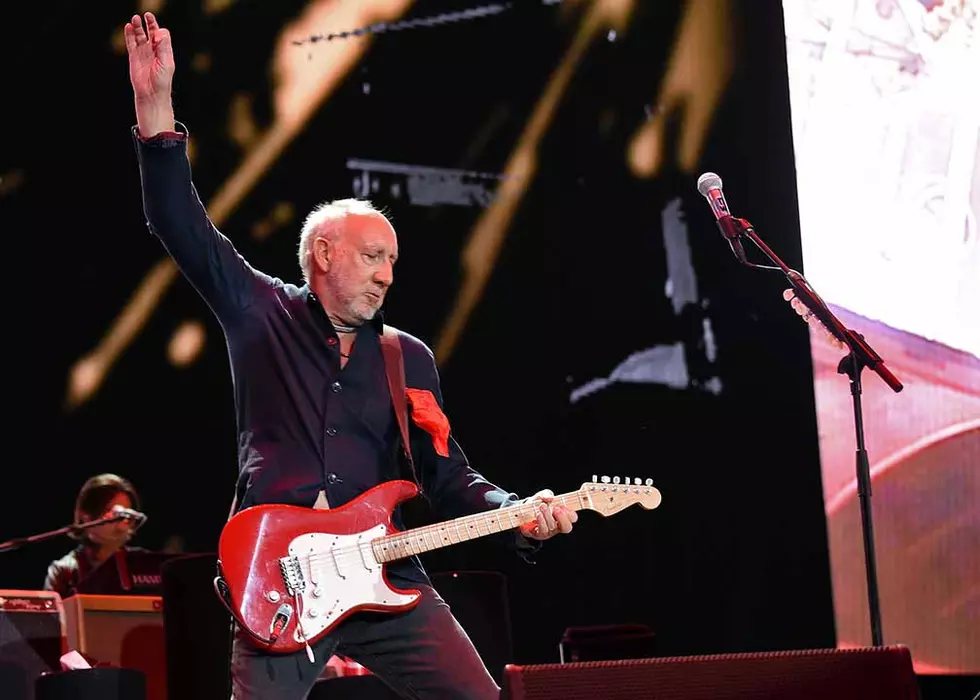
Pete Townshend Says He Was the Who’s ‘Timekeeper': Exclusive Interview
The Who’s Pete Townshend is always busy. To many fans' dismay, it’s not always with Who projects.
Townshend is currently on the road for the Classic Quadrophenia tour, which is performed by a symphony orchestra and Townshend, Billy Idol, and British tenor Alfie Boe, and completely transforms the Who’s landmark 1973 album. Townshend couldn’t be more proud of the result and took some time to explain to Ultimate Classic Rock how the project began, Idol and Boe’s roles in the performance and how Keith Moon was unlike any other drummer.
What pushed you to transform Quadrophenia into a symphonic work?
It was a process that grew out of doing orchestrations of the last pieces that I composed over the recent years. As I get older, I want to have folios, I suppose, that people can go back to and refer to that have been approved by me. In this case, I got my wife [musician Rachel Fuller] to do these orchestrations, and [classical label] Deutsche Grammophon heard about them and wanted to do an album. That’s how that happened, but in the beginning, this project was never meant to be a record.
Now that it is a record, what do you feel Classic Quadrophenia demonstrates?
It’s difficult to say this without sounding conceited, but it feels to me that the composition, the writing, the structure, has … well, it’s not that it has risen above what we did as a rock band, but it certainly stands in its own territory. It’s authentic. It feels unadorned. Funny enough, this idea of rock with symphony orchestra is supposed to make the rock music better or different in someway. In this case, it feels to me that the new orchestration stands alone, it stands on its own. It’s a good, cohesive piece of work. It might appeal to people who don’t like how relentless the Who’s version of the album is. [Laughs]. Maybe this will get few extra people to give it try.
More than anything else you’ve done, I feel Quadrophenia was meant to be adapted for an orchestra. You listen to those synthesizer parts and they already sound like swelling string sections.
Had I been able to orchestrate when I did the first recording, I might have done something similar to the new piece. But I wanted the Who to be able to play it onstage, so I was hoping we would be able to use some of the complete synthesizers and brass parts on tape, which we had done on the Who’s Next album with “Won’t Get Fooled Again” and “Baba O’Riley.” It proved to be very difficult, and so we never did it, but that was the mission. Thinking back, even if I could have done orchestration, I probably would have stuck to trying to do it with keyboards. Of course, back at that time, ’71, ’72 and ’73, I was so enjoying getting into analog synthesizers with all the little knobs and cables and God know what. [Laughs]. It was such great fun.
When you listen to the two versions of Quadrophenia back to back, you can really hear two different vocal approaches. “Love Reign O’er Me” is so different. Can you hear that emotional difference?
Yes, of course I can. Quadrophenia was the only early Who album that I wrote entirely on my own, that I produced entirely on my own up until then. Therefore, I was in the room trying to guide Roger [Daltrey] and the way he sang “Love Reign O’er Me.” When he did his first couple of passes, it was quite shocking to me. I wasn’t ready for it, and I ran out in the studio and said, “Rog, this needs to be done a little bit more like ‘See Me, Feel Me’ on Tommy. It’s a pathetic young man who is sitting in the rain on a rock and he’s praying, he could drown at any moment and he’s desolate." And my engineer Ron Nevison said, “Pete, I disagree, I think Roger is nailing it.” I said to him, “It sounds to me like he’s screaming out to the gods.” And Ron said, I can’t remember exactly, but it was something like, “Well, that’s just another way of praying.” And I listened again, and of course Roger had absolutely nailed it. So, when it came to occasionally trying to sing this song myself at solo shows, I found it very, very difficult to sing. I found it difficult for me to sing because people expected me to scream, and that’s not the song that I wrote. So, when we did the first take with Alfie Boe, he just sang it like a tenor would sing it; he did it as it was on the page. He knew the song, of course, as a fan of the Who, but he sang it without any adornment – a straight cut. I felt the song touched me in the same way, but it came at me from a completely different direction. I was very pleased with the way Alfie’s classical tenor approach, not so much dignified the orchestra, but fit it. It didn’t jar. It didn’t feel like we were trying to combine classical orchestration with rock ‘n’ roll. It just felt like we delivered classical orchestration. I love Alfie’s approach. He’s particularly good live because he really belts it and is a fantastic performer.
You have put this whole tour together for just five shows. It seems like a lot of work to do for just a few concerts. Do you think there will be more?
There may be more. I very doubt that I would be involved in them. At first, I agreed to do one show between Who tour stints. Then I was bumped up to do two shows, then three, four, five – which is how these things go. This show is very much the about the orchestra, the choir and Alfie playing the role of Jimmy, and not about me, so I don’t know I need to tour with it more than this. We are hoping that there will be more, but we’ll see how the critics like it, how the audience’s like it. We’ll see whether Who fans will enjoy it or whether they spread negative response. A lot of fans are fearful whenever Roger and I do anything on our own.
Why do you think that is?
Well, if they are too supportive, they think we’ll never work as the Who again, and they really love the Who. [Laughs.] We’ve seen that with Mick Jagger and his solo albums. He’s done some fantastic solo albums and they never sell because, in my opinion, people don’t want him to stop working in the Rolling Stones.
I hope fans take the time to check this out because it takes a piece many consider your masterpiece, me included, and enhances its legacy.
We shall see, I hope that people will take it at face value and get a kick out of it. Rachel said to me at lunch today, “It’s a very moving piece to sit and listen to with an orchestra live.” And I think it has something that’s on a par of what the Who can do live. It has the same power and impact and rhythmic structure. In the Who we had a drummer, here we have six percussionists. It’s a thunderous, explosive and exciting musical event. It’s like seeing a Hans Zimmer score for a Batman movie. It’s a big noise.
Much of that big sound in rock n’ roll, the kind of crescendos that you pioneered in the Who, can be very analogous to what an orchestra does in a piece by Stravinsky or Tchaikovsky or other composers famous for great bombast.
And there’s more to it than that, isn’t there? Keith Moon is a legend, in many ways. One of the areas in which Roger and I have come to appreciate Keith since he has gone is that there’s no drummer who is quite so orchestral. He was an embellisher, a decorator; he was a percussionist in the truest sense. He could keep a beat, but that wasn’t what he aimed at. He aimed at decoration, augmentation – at supporting the music, at generating uplift. That was his passion when he played. And it’s where his personality expressed itself most acutely. He just exploded in a continual stream of machine-gun spurts of energy. But, for many years I was the timekeeper. People say that I’m a better rhythm guitarist than a lead guitarist, that’s because for 20 years I had to keep time. I was the drummer.
I love that you got Billy Idol for this tour. With Billy and Alfie, you have the complete ends of the spectrum of singing. Is that why you wanted him?
We wanted Billy for another reason. He’s been a part of my Quadrophenia life since in 1996 when we took it back on tour. He was just absolutely brilliant as Ace Face and the Bellboy. He brought the house down. Alfie does stomp about and he does try to be a rock star. But he isn't. Now Billy, he's a very lovely, mild-mannered man to be around – but when he walks onstage, he morphs into this fantastic being. I suppose we wanted him to be part of this because he is such a fantastic performer. But he also sings the songs beautifully. We just wanted to have some action, and Billy provides that because I won't be swinging my arm or jumping up and down.
I understand Eddie Vedder is joining you for the Chicago show on Sept. 13. That'll be really something to add him to the mix. What will he be doing in the show?
He will probably be playing the role of the punk in the song “The Punk and the Godfather.” And I think I will also ask him to do the song “I’m One,” which is just perfect for him. He and I may do “Drowned” together. We're going to make the Chicago show a little different because it is a charity show.
It seems like you and Pearl Jam have been pretty tight for a while. What's that relationship like?
I don't know the whole band that well. I have met them at Neil Young’s Bridge Concert about 10 years ago, and I do like them. But I would count Eddie as a family friend. When he comes to London, he goes to visit my brother Paul, who’s a painter and decorator, and he hangs out with Paul and his family and goes to the local pub and gets drunk. He supports my brother Simon in his solo shows, and he'll often appear with them. He often invites Simon to appear with him when he does solo shows. So, he's very close to the family. And he and I do have a bit of Chicago history, doing a couple charity shows in the past, so I was really excited when he decided to do it.
See Who Drummer Keith Moon’s Craziest Antics
Who Albums Ranked
More From 99.1 The Whale

